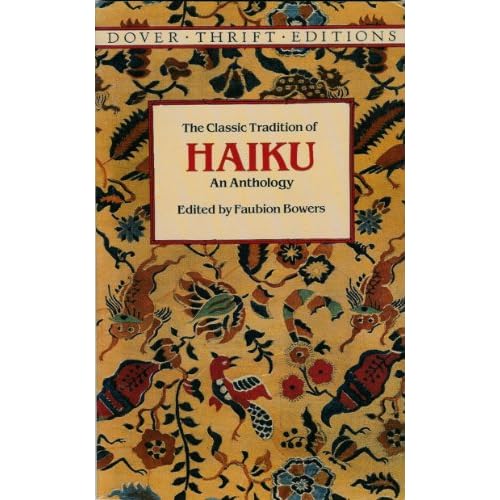
I have just finished a wonderful book for those wishing to buy an inexpensive collection of haiku from the masters of the form, or looking for a good starting point for reading haiku.
The Classic Tradition of Haiku: An Anthology does five things very well. For one, it includes the original poems (in romaji, which means that they're written using the English alphabet, rather than in kanji or hiragana). Sound is crucial in poetry, and no more so than in haiku, so this is a big plus. For another, it includes one or more translations of the poem into English, including the initials of the translator or translators (a list is provided in the "Acknowledgment to Translators" chapter near the beginning of the book). Third, the foreword gives a brief, but good, synopsis of the history behind haiku and the essence of haiku. Fourth, footnotes throughout the book provide excellent comments on individual poems and poets, including highlighting the contrasts to be found in each poem, describing the inspiration behind a poem or series of poems, pointing out some biographical details on some of the more significant haiku poets, and singling out the four "greats" of the genre: Bashō, Buson, Issa, and Shiki, the last of whom is the father of modern haiku. And finally, it contains a diverse array of haiku and haikai poets, while making sure to include the most significant poems and poets.
My only caveat is that I would have liked to have seen the poems written in their original language as well as in romaji (and vertically, since that is traditionally how Japanese is written), with furigana written above the kanji, though writing the poems in romaji does makes it accessible to a wider range of people. Still, I always like to do my own translating when I'm somewhat familiar with a foreign language, and the absence of kanji makes it difficult for me to remember the meanings of words that I have forgotten. Also, it would lend itself to subtleties of meaning that, while possibly covered by multiple translations, can only be truly appreciated in the original language.
Still, this is a very small caveat, and even seasoned lovers of haiku should check out this book, as it may expose them to a wider cross-section of haiku poets than they knew existed.
I'm profoundly confused: how much Japanese do you know?
ReplyDeleteAnyway, good to see a book review finally.
Oh, and by the way, I read a couple of stories by Faulkner ("The Bear Hunt" and "Two Soldiers"), whom I know you admire a lot, and they were amazing, amazing and beautiful.
ReplyDeleteAnd, while you are on Japanese literature, have you read Akutagawa Ryunosuke, who wrote the two stories Rashomon was based on?
I read "Rashomon" today, and I think that taking the title from this story (the two plotlines have very little in common, at first sight) was one of Kurosawa's best decisions for the movie.
Even independent of the fact that the other one is called "In the Bamboo Woods".
Finally, sorry for the unrelated comments. This article is good enough that it deserves more than spam.
I know more Japanese than I think I do, but less than Japanese people think I do. ;-)
ReplyDeleteWhen I lived in Japan, I passed the Level 3 Japanese Proficiency Test, which is considered conversational level Japanese (can read 300 kanji, know 1500 words). I can read hiragana and katana and know almost 400 kanji--on a good day. On a bad day, I know about 150-200 kanji.
I have not read Ryunosuke, though he is considered one of Japan's greatest short story writers. And yes, Kurosawa picked the right title for his movie.
Glad you liked Faulkner. I'm planning to read The Sound and the Fury sometime this year. Once I finish it, he'll be included here as one of "My Favorite Authors."
Also, I got your video, but the link isn't working on my blog (apparently, blogger only allows videos to be embedded in the post itself). So, here's the link to that video: http://www.youtube.com/watch?v=anwy2MPT5RE&feature=player_embedded
ReplyDeleteAkutagawa is worth reading.
ReplyDeleteBy a very non-Japanese author (I invite you to guess):
ReplyDeleteA twitching tail
A tawny tufted tummy
A tired tiger
I have a few guesses for this one: A.A. Milne, Rudyard Kipling, or Bill Watterson (though I have all the Calvin and Hobbes strips, so I doubt it's that one). Of course, I could cheat and look it up online, but I have decided not to. :-)
ReplyDeletehttp://www.google.com/search?q=A%20twitching%20tail%0D%0AA%20tawny%20tufted%20tummy%0D%0AA%20tired%20tiger
ReplyDeleteIt was Bill Watterson. I should never doubt myself! :-) Maybe another one of these posts will deal with how huge of a Calvin and Hobbes fan I am.
ReplyDelete